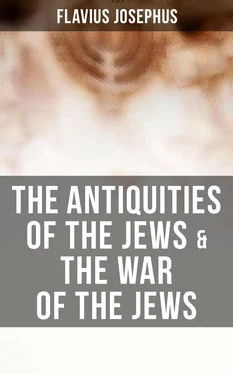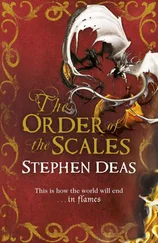10. Thus Saul having escaped the hands of David twice, he went his way to his royal palace, and his own city: but David was afraid, that if he staid there he should be caught by Saul; so he thought it better to go up into the land of the Philistines, and abide there. Accordingly, he came with the six hundred men that were with him to Achish, the king of Gath, which was one of their five cities. Now the king received both him and his men, and gave them a place to inhabit in. He had with him also his two wives, Ahinoam and Abigail, and he dwelt in Gath. But when Saul heard this, he took no further care about sending to him, or going after him, because he had been twice, in a manner, caught by him, while he was himself endeavoring to catch him. However, David had no mind to continue in the city of Gath, but desired the king, that since he had received him with such humanity, that he would grant him another favor, and bestow upon him some place of that country for his habitation, for he was ashamed, by living in the city, to be grievous and burdensome to him. So Achish gave him a certain village called Ziklag; which place David and his sons were fond of when he was king, and reckoned it to be their peculiar inheritance. But about those matters we shall give the reader further information elsewhere. Now the time that David dwelt in Ziklag, in the land of the Philistines, was four months and twenty days. And now he privately attacked those Geshurites and Amalekites that were neighbors to the Philistines, and laid waste their country, and took much prey of their beasts and camels, and then returned home; but David abstained from the men, as fearing they should discover him to king Achish; yet did he send part of the prey to him as a free gift. And when the king inquired whom they had attacked when they brought away the prey, he said, those that lay to the south of the Jews, and inhabited in the plain; whereby he persuaded Achish to approve of what he had done, for he hoped that David had fought against his own nation, and that now he should have him for his servant all his life long, and that he would stay in his country.
1The phrase in David's speech to Saul, as set down in Josephus, that he had abstained from just revenge, puts me in mind of the like words in the Apostolical Constitutions, B. VII. ch. 2., "That revenge is not evil, but that patience is more honorable."
2The number of men that came first to David, are distinctly in Josephus, and in our common copies, but four hundred. When he was at Keilah still but four hundred, both in Josephus and in the LXXX.; but six hundred in our Hebrew copies, 1 Samuel 23:3; see 30:9, 10. Now the six hundred there mentioned are here estimated by Josephus to have been so many, only by an augmentation of two hundred afterward, which I suppose is the true solution of this seeming disagreement.
3In this and the two next sections, we may perceive how Josephus, nay, how Abigail herself, would understand, the "not avenging ourselves, but heaping coals of fire on the head of the injurious," Proverbs 25:22; Romans 12:20, not as we do now, of them into but of leaving them to the judgment of God, "to whom vengeance belongeth," Deuteronomy 32:35; Psalms 94:1; Hebrews 10:30, and who will take vengeance on the wicked. And since all God's judgments are just, and all fit to be executed, and all at length for the good of the persons punished, I incline to think that to be the meaning of this phrase of "heaping coals of fire on their heads."
4We may note here, that how sacred soever an oath was esteemed among the people of God in old times, they did not think it obligatory where the action was plainly unlawful. For so we see it was in this case of David, who, although he had sworn to destroy Nabal and his family, yet does he here, and 1 Samuel 25:32-41, bless God for preventing his keeping his oath, and shedding of blood, which he had swore to do.
CHAPTER 14
How Saul Upon God's Not Answering Him Concerning The Fight With The Philistines Desired A Necromantic Woman To Raise Up The Soul Of Samuel To Him; And How He Died, With His Sons Upon The Overthrow Of The Hebrews In Battle
Table of Contents
1. About the same time the Philistines resolved to make war against the Israelites, and sent to all their confederates that they would go along with them to the war to Reggan, (near the city Shunem,) whence they might gather themselves together, and suddenly attack the Hebrews. Then did Achish, the king of Gath, desire David to assist them with his armed men against the Hebrews. This he readily promised; and said that the time was now come wherein he might requite him for his kindness and hospitality. So the king promised to make him the keeper of his body, after the victory, supposing that the battle with the enemy succeeded to their mind; which promise of honor and confidence he made on purpose to increase his zeal for his service.
2. Now Saul, the king of the Hebrews, had cast out of the country the fortune-tellers, and the necromancers, and all such as exercised the like arts, excepting the prophets. But when he heard that the Philistines were already come, and had pitched their camp near the city Shunem, situate in the plain, he made haste to oppose them with his forces; and when he was come to a certain mountain called Gilboa, he pitched his camp over-against the enemy; but when he saw the enemy's army he was greatly troubled, because it appeared to him to be numerous, and superior to his own; and he inquired of God by the prophets concerning the battle, that he might know beforehand what would be the event of it. And when God did not answer him, Saul was under a still greater dread, and his courage fell, foreseeing, as was but reasonable to suppose, that mischief would befall him, now God was not there to assist him; yet did he bid his servants to inquire out for him some woman that was a necromancer and called up the souls of the dead, that So he might know whether his affairs would succeed to his mind; for this sort of necromantic women that bring up the souls of the dead, do by them foretell future events to such as desire them. And one of his servants told him that there was such a woman in the city Endor, but was known to nobody in the camp; hereupon Saul put off his royal apparel, and took two of those his servants with him, whom he knew to be most faithful to him, and came to Endor to the woman, and entreated her to act the part of a fortune-teller, and to bring up such a soul to him as he should name to her. But when the woman opposed his motion, and said she did not despise the king, who had banished this sort of fortune- tellers, and that he did not do well himself, when she had done him no harm, to endeavor to lay a snare for her, and to discover that she exercised a forbidden art, in order to procure her to be punished, he sware that nobody should know what she did; and that he would not tell any one else what she foretold, but that she should incur no danger. As soon as he had induced her by this oath to fear no harm, he bid her bring up to him the soul of Samuel. She, not knowing who Samuel was, called him out of Hades. When he appeared, and the woman saw one that was venerable, and of a divine form, she was in disorder; and being astonished at the sight, she said, "Art not thou king Saul?" for Samuel had informed her who he was. When he had owned that to be true, and had asked her whence her disorder arose, she said that she saw a certain person ascend, who in his form was like to a god. And when he bid her tell him what he resembled, in what habit he appeared, and of what age he was, she told him he was an old man already, and of a glorious personage, and had on a sacerdotal mantle. So the king discovered by these signs that he was Samuel; and he fell down upon the ground, and saluted and worshipped him. And when the soul of Samuel asked him why he had disturbed him, and caused him to be brought up, he lamented the necessity he was under; for he said, that his enemies pressed heavily upon him; that he was in distress what to do in his present circumstances; that he was forsaken of God, and could obtain no prediction of what was coming, neither by prophets nor by dreams; and that "these were the reasons why I have recourse to time, who always took great care of me." But 1Samuel, seeing that the end of Saul's life was come, said, "It is in vain for thee to desire to learn of me any thing future, when God hath forsaken thee: however, hear what I say, that David is to be king, and to finish this war with good success; and thou art to lose thy dominion and thy life, because thou didst not obey God in the war with the Amalekites, and hast not kept his commandments, as I foretold thee while I was alive. Know, therefore, that the people shall be made subject to their enemies, and that thou, with thy sons, shall fall in the battle tomorrow, and thou shalt then be with me (in Hades)."
Читать дальше












